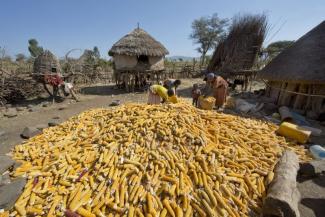Human security
Transatlantic cooperation

Famines are currently threatening to devastate southern and eastern Africa. The El Niño phenomenon is exacerbating climate change, causing one of the worst draughts in decades. Aid agencies and the UN expect that more than 45 million people need – or will soon need – food aid.
A harsh drought similarly preceded Syria’s civil war, write Michael Werz from the Washington-based Center for American Progress and Benjamin Pohl form adelphi in Berlin. The two think-tank employees consider food shortages a cause of the uprisings.
Food crises are not merely a humanitarian issue. They lead to political and economic instability all over the world and cause social unrest, the authors argue. In their eyes, climate change is causing or compounding draughts and water shortages. To rise to these challenges, they recommend more international cooperation. In particular, they call for innovative and farsighted transatlantic policymaking.
According to Werz and Pohl, leaders from the EU and the USA are only beginning to draft measures and programmes and providing international capacities. The risks are interrelated, they warn, so any solutions must be based in all fields of policymaking. Measures must not counteract one another in core areas such as climate protection, humanitarian aid and peace promotion.
To illustrate problems, Werz and Pohl discuss investments in hydropower. This approach helps to reduce greenhouse-gas emissions, but it may undermine food security if dams lead to water shortages downstream. The authors point out that it is currently more profitable to use water to generate electric power than for irrigating fields. In their eyes, the USA and EU should prevent market distortions of this kind. The international community should set incentives to make countries take action in order to safeguard food security without exacerbating climate change. They point out that the production of agrarian fuels contributed to food shortages too.
Werz and Pohl admit that it is not easy to rise to complex challenges. Holistic solutions are needed. Sharing information is essential, according to the two experts, and the USA and EU should assume leadership. Big food corporations in particular should provide access to their data, the authors demand. So far, they are not doing so.
There are several things the USA and EU could do, according to Werz and Pohl.
- First of all, they could improve data access in order to allow for more rigorous numbers crunching. It would make sense to spot disturbances of the global food system before they cause harm.
- Second, the USA and EU could boost the effectiveness of existing initiatives.
- Third, the two partners should consider increasing humanitarian aid given that ever more people are displaced from their homes. Humanitarian aid should serve to enhance the resilience of the affected communities. Development assistance and humanitarian aid need to be linked in a better way, the authors demand.
Finally, Werz and Pohl want the institutions of global governance to be strengthened. The USA and EU could convene multilateral meetings such as the G20 to get a grip on food security, for example.
Sabine Balk
Link
Supporting global food security in a changing climate through transatlantic cooperation:
https://www.adelphi.de/de/publikation/supporting-global-food-security-changing-climate-through-transatlantic-cooperation










